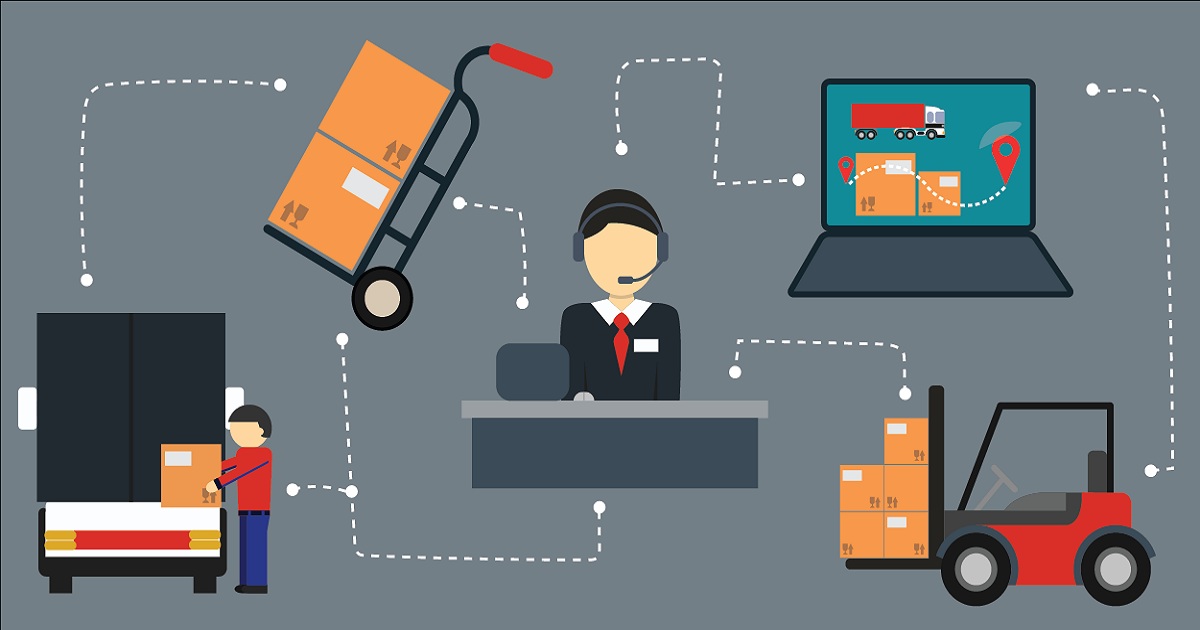
Supply Chain
Article | May 26, 2023
The rapid growth of e-commerce continues to create new challenges for retailers as they plan distribution strategies. One of those challenges is managing the high volume of returns. One in three shoppers returns items, and more than half read a company’s returns policy before making a purchase. Retailers lose $50 billion annually due to inefficiencies in processing returns, and distribution centers handling returns need 15% to 20% more space than a traditional facility.
Read More

Warehousing and Distribution
Article | July 11, 2023
Transportation has always been the cornerstone of the supply chain and arguably its most targeted area when something goes wrong with a shipment. Why is my package late? What is my load’s current location? What is the ETA for my order? These are the daily questions that come from warehouses, distribution centers, and their end consumers – and they’re being asked now more than ever. Answering these questions requires holistic visibility into your supply chain that can only be achieved with the right mix of transportation technology and data management.
Read More

Warehousing and Distribution
Article | July 11, 2023
At Schneider Electric, meeting our customers’ expectations is a key priority. As concern over COVID-19 (Novel Coronavirus) grows, we are monitoring developments to this situation globally, as well as following local health and government regulations, continually assessing and responding to changes.
Our Business Continuity Plan (BCP) has been tested and implemented in geographies impacted. This plan includes health and safety, supply chain, lifecycle management services, and IT infrastructure.
Schneider Electric operations meet the criteria of an essential critical infrastructure as defined by most governments. While we do not anticipate interruptions to our operations, local governments may require temporary containment measures. In these cases, we comply with local laws, and in most cases seek support from local authorities to maintain critical business operations as an essential business for our communities.
Read More

Article | May 31, 2021
Supply chain is the backbone of any business. Since there is a supply chain in existence, you can buy whatever product you want. The supply chain is evolving since the Industrial Revolution, and it is still changing, and the evolution journey is fascinating. Before moving forward with the article, first, let's understand supply chain and supply chain management.
What is a Supply Chain?
A supply chain is an entire process of producing and selling commercial goods, beginning with the procurement of raw materials and ending with the distribution and sale of the goods. The supply chain ensures that a product is available in the right place, at the right time, and the lowest possible cost while ensuring the product quality. The supply chain aims to provide the maximum value to the customer at the minimum likely costs. The supply chain is the single most significant expense for businesses, and it provides them with a tremendous opportunity to improve and increase savings and profit margins. The price of most products is competitive in the market, but the supply chain determines the product's profit margin. The demand for products and services fluctuates for various reasons, and meeting this fluctuating demand with a higher degree of quality requires knowledge of supply chain management. Effective supply chain management is essential for any business to compete in the market.
What is Supply Chain Management?
Supply chain management is an essential factor in a business's long-term success. The management of how goods and services evolve from raw materials to products sold to consumers is known as supply chain management. It includes the processes of transporting and storing raw materials, storing finished goods until they sell, and tracking where sold goods go so that you can use the data to boost future sales. Supply Chain Management includes all aspects of business activities, including logistics, purchasing, and information technology. Materials, finances, suppliers, manufacturing plants, wholesalers, retailers, and consumers are all combined into a single system. A business with a well-managed supply chain can significantly reduce all operating costs associated with that chain, resulting in higher profits. The main goal of effective supply chain management is to increase profitability by improving customer satisfaction and reducing business costs. Profits improve as expenses are in control and reduced when possible. When the costs of purchasing raw materials and manufacturing goods drop, the operating costs also decrease.
Challenges in Supply Chain Management
There are many challenges related to supply chain management. In this section, we will focus on some of the most significant supply chain management challenges.
• Visibility: It is a significant issue in supply chain management. Businesses are unable to track all international cargo. The majority of data on the ocean or air shipments is often unavailable. Between 2008 and 2016, an average of 600 containers lost at sea (it does not include catastrophic incidents). These figures are concerning because the amount of cargo shipped over time is rapidly rising.
• Uncertainty: Uncertainty has been difficult in supply chain management. Demand planning is essential because many businesses have massive amounts of leftovers. If it is perishable, it is thrown away. There is a lot of waste, and it's all because of bad planning. In addition, initial raw materials may be unreliable, or lead time may be unpredictable. It isn't easy to be confident of any part of the supply chain, mainly because it is an extensive system.
• Customer Service: Supply chain management is all about getting the right product to the correct location at the right time. It seems easy at first, but it can quickly become complicated.
• Cost Management: Increasing energy/fuel and freight costs, a more significant number of global customers, technology, rising labor wages, new regulations, and rising commodity prices all strain operating costs.
• Planning and Risk Management: Annual reviews and redesigns are needed to be efficient and effective. These changes are in reaction to market changes, such as new product releases, global sourcing, credit availability, and the need to protect intellectual property. To monitor and minimize these threats, they must be identified and quantified.
• Supplier/Partner Relationship Management: It is crucial to create, understand, and follow mutually agreed standards to understand current performance and areas for improvement better. Using two separate approaches to measure and communicate performance results is a waste of time and resources. Trusting the system that was in place to ensure consistency and better supplier/partner relationships is necessary.
Emerging Trends in Supply Chain
The supply chain process is continuously evolving. The emerging supply chain and logistics trends prioritize intelligent, tech-driven management to minimize operational costs and enhance efficiency. The logistics and supply chain aspect is vital for any business in supplying high-quality raw materials, ensuring an efficient manufacturing process, and tracking, shipping, and storing finished goods.
Companies that implement well-designed supply chain practices can satisfy customer needs more quickly and efficiently. This improves customer relationships and loyalty, resulting in increased revenue and the acquisition of new customers through positive word of mouth.
Let's look at some significant emerging trends that are expected to shape and develop supply chain operations in the future.
Digitization of Supply Chains
Digitization is the process of reinventing logistics operations by combining the latest technology with other physical and digital assets. Digitization allows us to better adapt to the fast-paced, highly competitive, omnichannel business environment.
Digitization increases the speed, dynamics, and resiliency of supply chain operations, resulting in improved customer responsiveness and, ultimately, increased revenue. Companies that embrace digitalization can gain genuine value, improved revenue, and market valuation.
Companies should significantly redesign their supply chain strategy to gain the full benefits of digitization. It is not enough to decorate it with digital technology.
The Internet of Things (IoT) occupies a significant position in digitalization as a highly transformational technology solution in the logistics sphere. The Internet of Things (IoT) is a network of interconnected computing devices that allows data to be sent over networks without human input. It assists businesses in monitoring inventory, managing warehouse stock, optimizing fleet routes, and reducing dead miles.
Artificial Intelligence
Advanced Artificial Intelligence solutions have several uses in the supply chain, particularly in the warehousing area. The procurement process involves using gesture recognition solutions instead of keyboard and mouse. It also includes self-driving vehicles, which are designed to navigate without human assistance.
In the supply chain, the concept of robotics and automation is widely implemented. The new generation of robots is easier to program, more flexible, and more affordable. Their job is to help employees with repetitive and physically challenging tasks.
Enhanced Supply Chain Visibility
Proper supply chain data analysis can significantly boost business forecasting and decision-making. It can also optimize the use of inventory management, storage, and transportation resources.
Supply chain visibility provides information on what is happening at each stage of the supply chain. It is crucial for the overall efficiency of the supply chain process, which includes sourcing, manufacturing, transportation, and delivery.
Real-time inventory management is one of the advantages of enhanced chain visibility. It uses mobile point-of-sale systems and sensors, and it elevates inventory management to a whole new level.
For example, instead of paying for purchased goods at a store, customers can take the desired products and have the products immediately charged to their credit and debit cards. Furthermore, real-time inventory management allows for the replacement of goods as they are consumed.
Circular Supply Chain
The term "linear supply chain" refers to the traditional concept where goods travel in a straight line (from raw material to finished product). Modern logistics techniques are focused on the circular supply chain idea, which involves reusing previously, used products as raw materials.
Reusing products and materials is referred to as reverse logistics, and it is a novel and innovative technique. It assists businesses in reducing administrative and transportation expenses, increasing sustainability, improving customer service and loyalty, creating value, and conserving resources.
Used products can be kept in circulation if businesses work together with their suppliers and customers.
More focus on Risk Management and Supply Chain Resiliency
Without a doubt, companies must seriously consider supply chain risk management as a means to prepare for unfavorable circumstances. The increasing use of outsourcing, offshoring, product versatility, supply chain security, and significant interdependence across the supply chain highlights the need to deal with risks in the supply chain.
However, no matter how solid the plan is, it cannot prevent errors from happening. Here's where supply chain resilience comes into play. It is an accurate indicator of a company's ability to survive disruptive circumstances.
Visibility throughout the supply chain is necessary to detect disruptions, close collaboration with suppliers and distributors so that alternative supply routes can be found, and a good incident response plan to provide a course of action when disruption occurs are all steps that are important to make the supply chain more flexible and resilient.
Use of SaaS in the Supply Chain
The software-as-a-service (SaaS) Sapproach is growing in popularity in supply chain technology and logistics management and the growth of cloud computing. This is primarily due to SaaS's security and safety and the convenience of paying for precisely the services you require. Companies can avoid the high fixed costs of system maintenance, upgrades, and infrastructure-related expenditures by using SaaS.
Supply chains are continuously evolving technology, and the diversity of employee skill sets is playing an essential role in this evolution. Organizations are becoming more conscious of changes in their market competition and continuously updating or even reinventing their market offering to maintain and develop their market positioning.
Many companies are already turning to technology to improve their supply chain operations; however, before new systems are implemented and employees are upskilled to adapt to new ways of working, existing processes must be reviewed to eliminate waste activities from the supply chain, and data must be cleansed. To meet consumer demands, supply chains must be constantly checked for efficiency improvements and aligned with corporate strategy. At present, many organizations are reviewing the length of their supply chains, intending to minimize the overall size and bring supply chains closer to the organization or the end consumer, reduce risk exposure, eliminate waste, and align with corporate strategy.
FAQ’s
• What are the three foundations of supply chain?
The three foundations of a supply chain are strategy, service, and cost. Aligning the strategy, service and cost is essential to support your company’s overall business growth and objectives. A good strategy along with good service and reduced costs helps in increasing profitability and customer satisfaction.
• What are the pillars of supply chain?
Plan, Source, Make, Deliver and Return are the pillars of supply chain.
Planning involves strategies and methods to be planned, Sourcing means procuring raw materials and other services, Making means manufacturing, Deliver means ensuring that the products reach the customers on time and Return means post delivery customer support that is associated with all kinds of returned products.
• Why supply chain management is important?
The management of how goods and services evolve from raw materials to products sold to consumers is known as supply chain management. It includes the processes of transporting and storing raw materials, storing finished goods until they sell, and tracking where sold goods go so that you can use the data to boost future sales. A business with a well-managed supply chain can significantly reduce all operating costs associated with that chain, resulting in higher profits. The main goal of effective supply chain management is to increase profitability by improving customer satisfaction and reducing business costs.
{
"@context": "https://schema.org",
"@type": "FAQPage",
"mainEntity": [{
"@type": "Question",
"name": "What are the three foundations of supply chain?",
"acceptedAnswer": {
"@type": "Answer",
"text": "The three foundations of a supply chain are strategy, service, and cost. Aligning the strategy, service and cost is essential to support your company’s overall business growth and objectives. A good strategy along with good service and reduced costs helps in increasing profitability and customer satisfaction."
}
},{
"@type": "Question",
"name": "What are the pillars of supply chain?",
"acceptedAnswer": {
"@type": "Answer",
"text": "Plan, Source, Make, Deliver and Return are the pillars of supply chain.
Planning involves strategies and methods to be planned, Sourcing means procuring raw materials and other services, Making means manufacturing, Deliver means ensuring that the products reach the customers on time and Return means post delivery customer support that is associated with all kinds of returned products."
}
},{
"@type": "Question",
"name": "Why supply chain management is important?",
"acceptedAnswer": {
"@type": "Answer",
"text": "The management of how goods and services evolve from raw materials to products sold to consumers is known as supply chain management. It includes the processes of transporting and storing raw materials, storing finished goods until they sell, and tracking where sold goods go so that you can use the data to boost future sales. A business with a well-managed supply chain can significantly reduce all operating costs associated with that chain, resulting in higher profits. The main goal of effective supply chain management is to increase profitability by improving customer satisfaction and reducing business costs."
}
}]
}
Read More